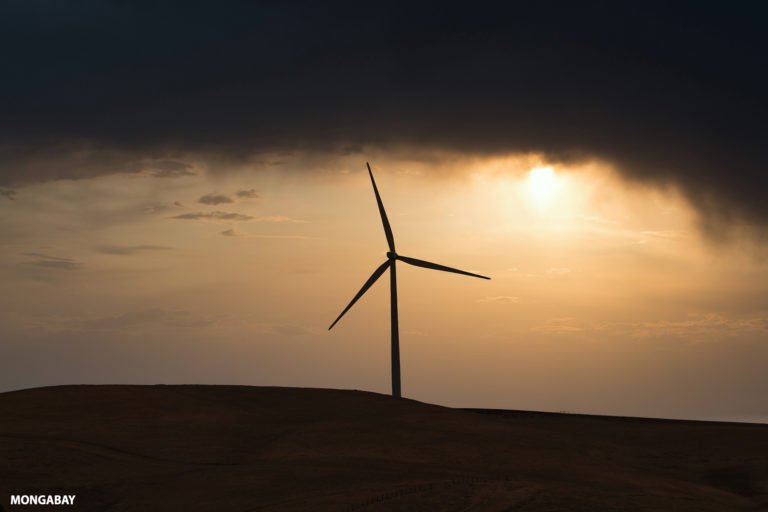- The Russian invasion of Ukraine has driven energy prices to the highest levels in years, spurring a global energy crisis.
- Nikolas Kozloff, a writer who authored “No Rain in the Amazon: How South America’s Climate Change Affects the Entire Planet,” examines America’s response, which he argues is so far shaping up to be a missed opportunity to transition toward greener energy sources.
- “The Ukraine crisis has the potential to finally nudge the world towards a long overdue clean energy future,” he writes. “However, the Biden administration seems to have calculated that pursuing short-term political gains must take priority.”
- This article is a commentary. The views expressed are those of the author, not necessarily of Mongabay.
However horrific, the Ukraine crisis has the potential to finally nudge the world towards a long overdue clean energy future. As one of the world’s top three suppliers of fossil fuels, Russia has contributed to the climate emergency, and the Kremlin has taken advantage of dirty profits to fund its war on Kyiv. To its credit, the Biden administration has banned Russian energy imports, and analysts believe the Ukraine crisis has the potential to “fast-track” renewable energy, while leading to a “tectonic shift” addressing climate change. Unfortunately, however, the Biden administration seems to have calculated that pursuing short-term political gains must take priority.
Moves to cut off Russian oil and gas have led to an increase in prices, and this has prompted the White House to tap reserves. Moreover, to the dismay of environmentalists, the Biden administration has called for oil and gas production to be ramped up. Somewhat jarringly, the same president who previously campaigned on reining in global warming has now decided to sacrifice climate goals in the name of keeping gas prices low, a reflection no doubt of impending congressional elections. As the Biden administration retreats from a robust discussion of climate change — emphasizing instead the notion of “energy security” — and approves new oil and gas permits on federal land, fossil fuel executives have seized the moment by pushing through new infrastructure projects.
Furthermore, the Ukraine crisis has sidelined Biden’s signature Build Back Better act, which in any case has been stripped of its most important climate provisions. Even as some “climate hawk” Democrats have sought to capitalize on the war in Ukraine by cutting off Putin’s energy exports, thereby aligning themselves with traditional foreign policy hawks, the party has agreed to higher military spending while dropping a bid to rapidly pull back on fossil fuels, with some going so far as joining Republicans, who have embraced an energy strategy predicated not just on renewables, but also on oil and gas. Indeed, mainstream Democrats now discordantly regard natural gas as a so-called “bridge” fuel to clean energy, and not anathema for the environment.
Even more incongruously, the White House has pursued a charm offensive towards Venezuela, an isolated dictatorship which is under sanctions, and Saudi Arabia, an authoritarian monarchy which has been tarnished by human rights abuses, so as to increase gas exports, replace Russia’s oil output and lower prices for American consumers. However, Saudi Arabia and the United Arab Emirates (U.A.E.) have played a leading role in the disastrous war in Yemen, which has resulted in a humanitarian catastrophe and killed almost a quarter million people. As a candidate, Biden pledged to make Saudi Arabia “a pariah” over rights abuses and the 2018 murder of journalist Jamal Khashoggi. Such campaign promises, however, completely crumbled once oil prices shot up, and Yemen, it seemed, was quickly forgotten. Additionally, the president’s outreach to Riyadh has strained relations with progressive members of his own party.

It’s not even clear whether the president’s overtures will bear fruit: though the White House announced it was planning a visit to Saudi Arabia to discuss global oil supply, the kingdom has declined to increase production. Observers believe Riyadh is reluctant to ramp up output too quickly, and in any case Crown Prince Mohammed bin Salman (MBS), who faces multiple lawsuits in the U.S., including over the killing of Khashoggi, is reportedly screening Biden’s phone calls. Perhaps that isn’t surprising, given that Saudi Arabia carefully weighs its links with the U.S. in relation to its economic and military ties to Russia. Moscow and Riyadh lead OPEC, the world’s oil cartel, and Saudi Arabia has refused to condemn Russia’s invasion of Ukraine. The U.S. has fared little better with the U.A.E., which has signed arms deals with Russia, depends on Russian tourism, and refuses to condemn Moscow when it comes to United Nations Security Council resolutions.
Faced with an unpromising milieu in the Middle East, Washington has been “scouring the world” to replace Russian crude. Administration officials have flown to Caracas to discuss easing sanctions on Venezuelan oil, which is ironic since Washington does not recognize Nicolás Maduro as a legitimate president. Though Russian ally Venezuela used to export a significant amount of oil to the U.S., that ended when Washington sanctioned Caracas over human rights abuses and undermining democracy. Like MBS, dealing with Maduro carries baggage, since the latter has been indicted for drug trafficking, amongst other charges. Despite shuttle diplomacy, analysts are skeptical in any case that Venezuela, with its deteriorating oil infrastructure, could make up for the shortfall in Russian crude. And, just as Biden’s outreach to Saudi Arabia angered progressive critics, White House negotiations with Venezuela have miffed the political right.

Facing diminishing returns, Biden could also open negotiations with Iran, though that country is also under sanctions. If a 2015 nuclear accord is restored, Iran could once again reenter oil markets, though in a further ironic twist, both Saudi Arabia and the U.A.E. view such talks warily. Taken as a whole, what should we make of such foreign policy contortions? While conservatives view foreign policy compromise as necessary, some have noted how the humanitarian disaster in Yemen has been superseded by Ukraine, while others regard the Saudi embrace as unjustified, even if such moves are designed to confront Russia. When it comes to climate, meanwhile, progressives believe the White House should take advantage of the Ukraine crisis to promote a green transition, rather than relying on human rights-abusing energy exporters. While it may not be easy, achieving such a transition could be accomplished, perhaps, through forceful leadership.
The Author: Nikolas Kozloff is the author of No Rain in the Amazon: How South America’s Climate Change Affects the Entire Planet, as well as scores of articles about the environment.










